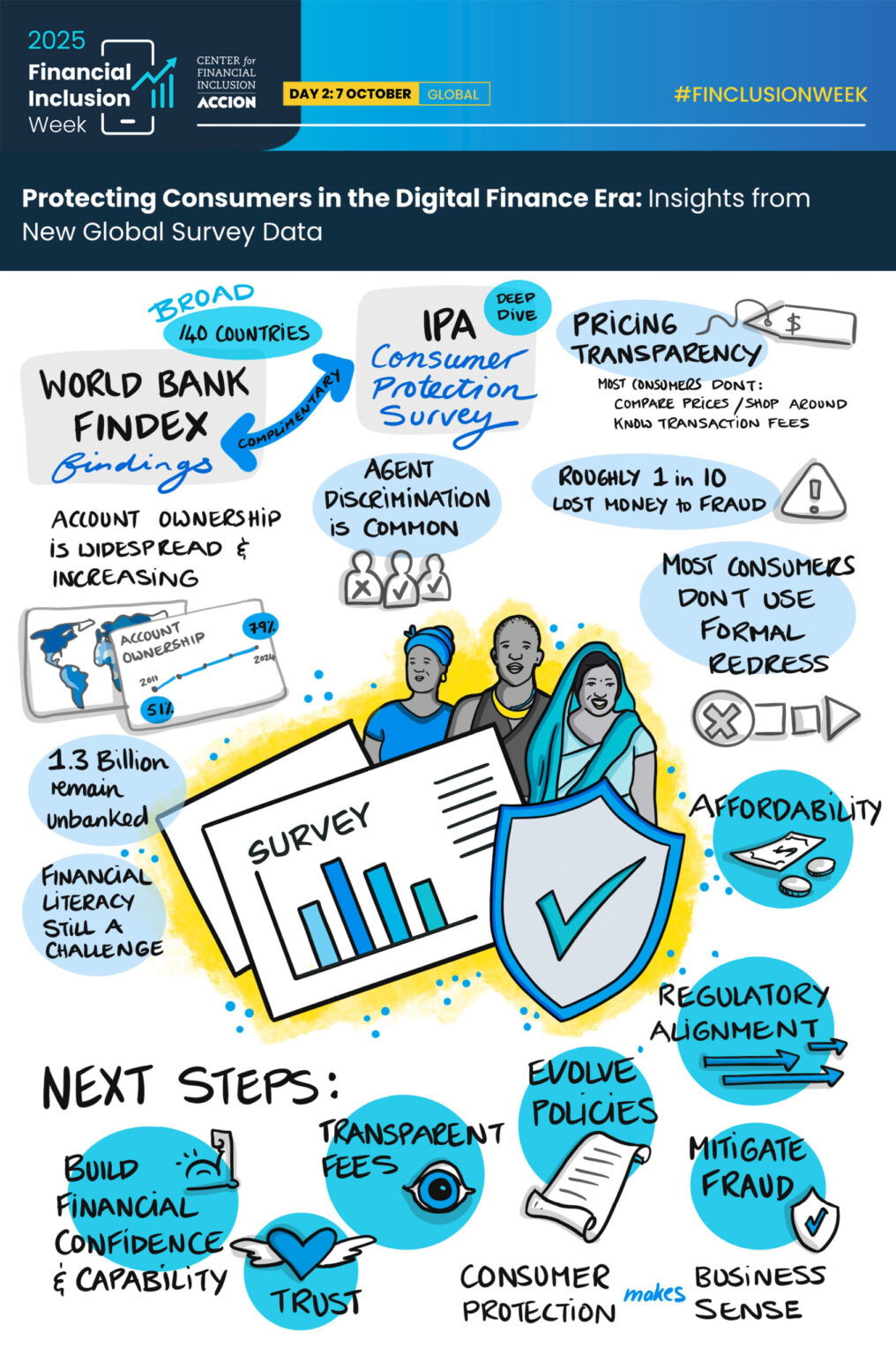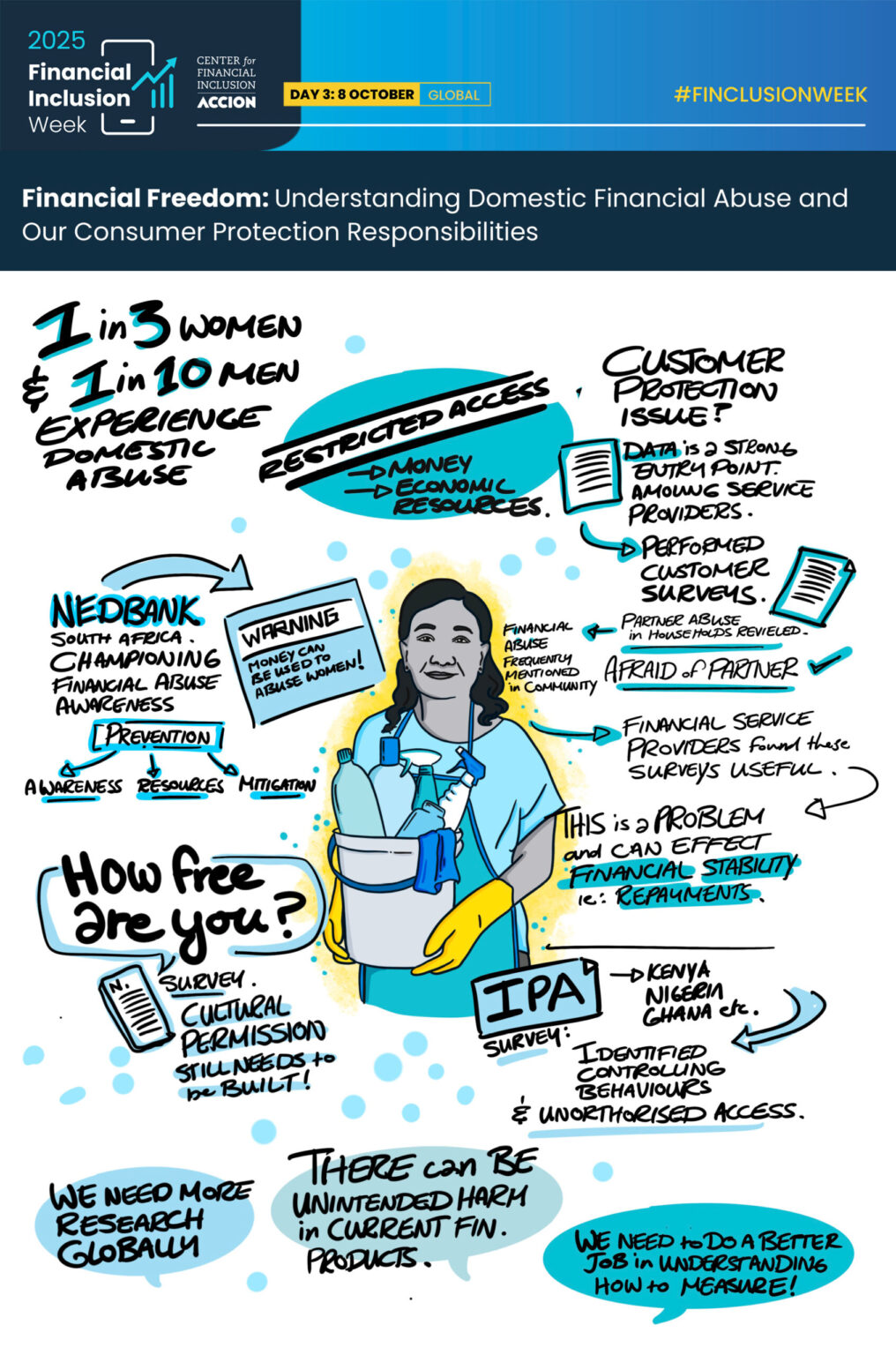IPA Presents at Financial Inclusion Week 2025
From October 6-9, 2025, IPA presented several sessions at the Center for Financial Inclusion’s Financial Inclusion Week (FIW). Learn more below:
1. Protecting Consumers in the Digital Finance Era: Insights from New Global Survey Data | Tuesday, Oct 7 at 8:15AM EDT

Digital financial services are transforming access to finance in low- and middle-income countries (LMICs). According to the Global Findex 2024, more than half of account holders in LMICs now use mobile phones or linked cards for digital transactions. Yet with this growth comes risk: hidden costs, fraud, over-indebtedness, and limited recourse when things go wrong. The Global Findex 2024 introduces new indicators on responsible digital use, offering a global view of emerging risks.
IPA is conducting a multi-year survey across ten LMICs to track the nature and frequency of digital financial services-related harms. FIW 2025 was one of the first opportunities to share early results from Kenya, Nigeria, the Philippines, Tanzania, and Uganda. In this session, researchers, policymakers, and industry representatives examined new evidence on consumer risks in the digital age and discussed findings, shared solutions, and explored priorities for advancing consumer protection.
2. Financial Freedom: Understanding Domestic Financial Abuse and Our Consumer Protection Responsibilities | Wednesday, October 8 at 11:15am EDT

Compounding risks to building resilience for vulnerable households are the ongoing, interpersonal dynamics that limit people's, especially women's, access to and effective use of financial services. Financial abuse, a form of domestic abuse, is any behavior that restricts, controls, or exploits another person’s access to money, economic resources, or participation in financial decisions. It is estimated that one in three women globally face domestic violence at least once in their lifetime, and almost 99 percent of the time, it is accompanied by financial abuse. This form of abuse remains largely invisible yet profoundly harmful and traps victim-survivors in poverty, debt, and continued physical danger. This session explored data collected in the past year that sought to capture experiences of financial abuse across multiple contexts, such as Benin, the Philippines, Uganda, Kenya, India, South Africa, and beyond. Panelists discussed the implications of this data for the financial services sector and consumer protection efforts.
3. Linking Evidence to Action: How Financial Services Can Support Climate Resilience | Pre-Recorded Session
Climate change threatens to push millions into poverty, with 3.3 billion people living in highly vulnerable regions. Despite billions in global climate finance and $63 billion allocated to adaptation, it remains unclear how much reaches low-income communities. Vulnerable households continue to face high risks, with the 2025 Findex showing 47 percent of adults in low-income countries struggle to raise emergency funds—often relying on family and friends. The financial sector has a critical role to play. Inclusive tools like savings, credit, and insurance can help people prepare for and recover from climate shocks. With 79 percent of adults worldwide now owning an account, including mobile accounts, there is unprecedented potential to expand climate-smart financial solutions. This panel brought together researchers, financial service providers, and policy experts to share new evidence, reflect on emerging innovations, and identify research gaps and opportunities for inclusive, climate-resilient finance.
4. Banking on Each Other: Savings Groups as a Path to Financial Resilience | Pre-Recorded Session
Over 1.3 billion adults worldwide remain unbanked. Savings groups have become a critical entry point to financial inclusion, offering a way for those excluded from formal banking systems to build savings, access small loans, and invest in business and household needs. With nearly 500 million members globally—80 percent of whom are women—these groups are unlocking new opportunities for economic empowerment. But how can we maximize their impact? In this session, panelists discussed the role of savings groups in advancing financial inclusion, exploring what the latest evidence tells us and where current research is uncovering innovations that can strengthen outcomes for vulnerable populations.












